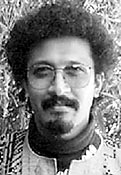 |
|
Julian Kunnie
Director of Africana Studies
|
|
|
By by Julian Kunnie
Arizona Daily Wildcat
Wednesday, April 21, 2004
Print this
Imagine you are the president of a nation, democratically elected by 70 percent of the people in your country, and in the wee hours one morning, you, your spouse and your bodyguards are suddenly awakened by armed men who insist that your life is in danger and that you have to immediately tend your resignation as president. You are then whisked off into a car and led to believe you are being driven to the national palace. You soon realize you are in fact headed toward the country's international airport, where you, your wife and your personal bodyguards are escorted onto a U.S.-charted plane. You are mystified into a shocked stupor when the window shutters on the plane are drawn down and you are unaware of your destination as the plane soars into the morning sky. Several hours later, you land in a country quite unknown to you ÷ the Central African Republic.
If the anecdote recounted above by Jean-Bertrand Aristide, the democratically elected president of Haiti, the Caribbean island nation, sounds like a kidnapping, it certainly was, orchestrated and executed by the U.S. government. It occurred in the early hours of Feb. 29. The State Department claimed that President Aristide had volitionally resigned and fled the besieged country of Haiti into exile in the Central African Republic. Yet how was it that Aristide was totally unaware of the country to which he was supposedly fleeing? News of the Aristide coup ÷ and it was a coup, since it involved the kidnapping and forcible removal of a democratically elected leader ÷ appeared in newspapers and television reports for a couple of weeks after the removal of the Haitian president. Then there was an eerie and uneasy silence, as if to say all was well in Haiti.
Far from it. There was a situation of escalating violence and terror, perpetrated by groups of bandits and thugs, many of who were from the previous military regime that first overthrew Aristide in 1991. Aristide, candidate of the Lavalas Party, was elected in 1990 in a landslide victory by the Haitian people, who for the first time saw a hopeful future led by a man dedicated to transforming the condition of impoverishment in Haiti. Yet there was no respite from the terrorists. Aristide was overthrown in a military-led coup in 1991. The United States restored Aristide as president of Haiti in 1994 after removing the Haitian military regime of Raoul Cedras as a result of pressure by the Congressional Black Caucus and TransAfrica, which was founded by Randall Robinson. Aristide was re-elected in 2000 and overthrown in 2004. Louis-Jodel Chamblain, a former death squad leader and a founder of the Front for the Advancement of Progress in Haiti, which was active between 1991 and 1994, has returned to terrorize Haitians in 2004. The International Republican Institute, headed by Arizona Sen. John McCain, has funneled funds to these "opposition forces" in Haiti. It is no surprise, then, that the current leader of the military terrorist group ruling Haiti, Guy Philippe, welcomed the U.S. Marines to Haiti.
It appears that the United States has never forgiven Haiti for being the first black, freed independent republic in the world following the Haitian revolution in 1804. For 50 years, the U.S. government refused to recognize the government of Haiti since it was a nation of freed enslaved Africans who were successful in defeating the military might of French and British colonial forces under the valiant leadership of Toussaint L'Overture. The United States had fully backed the French demand that Haiti repay France $120 million in compensation for property losses as a result of the abolition of slavery. U.S. Marines had ransacked the Bank of Haiti in 1915 and stole $500,000, which today is part of the loot that makes up the wealth of the trillion-dollar Citibank.
We must never forget ÷ justice delayed is justice denied. The Haitian people have never caused any injury or affront to the United States or its people. All they championed was freedom for themselves and for all the people of Latin America living under the yoke of slavery. It was the Haitians who proffered material support to Simon Bolivar in the early 1800s, which resulted in much of the continent becoming independent. Haiti cannot be forgotten in our memory for its humiliation and subjugation still stares us in the face.
To hear more about the situation in Haiti, come and listen to Randall Robinson, a human rights activist and author who was personally involved in Haiti's struggle for freedom, at the Grand Ballroom at the Student Union Memorial Center at 7 tonight.
Julian Kunnie is director and professor of Africana Studies.

